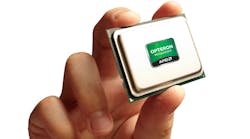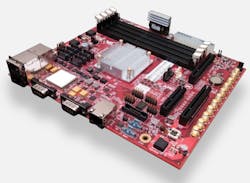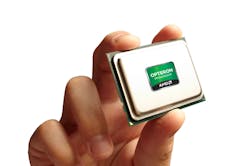AMD is going where Intel may not be able to follow, the 64-bit ARM market. It just announced the Opteron A1100 microprocessor based on ARM's 64-bit Cortex-A57 architecture (see Delivering 64-Bit Arm Platforms). AMD continues is x86 Opteron processors with the announcement of two new Opteron 6300 series processors as well.
Related Articles
- Delivering 64-Bit Arm Platforms
- Architecture Ushers In 64-Bit Computing For Digital Homes
- 64-bit And Real-Time Architectures At Arm TechCon
- ARM Joins The 64-bit Club
- Unified Heterogeneous Computing Arrives
The Opteron A1100 is a system-on-chip (SoC) solution that can access to 128 Gbytes of RAM via a pair of memory channels that support DDR3 and DDR4 memory. It is initially available in 4- and 8-core versions. The cores will be running at speeds in excess of 2 GHz. They will have 4 Mbytes of shared L2 cache and 8 Mbytes of shared L3 cache. It also includes a number of hardware acceleration units including some standard ARM technology such as the ARM TrustZone security support.
Opteron A1100 peripheral interfaces include x8 PCI Express Gen 3, eight SATA 3 ports and two 10 Gbit Ethernet ports. The PCI Express Gen 3 interface can also operate as a pair of x4 ports.
The AMD Opteron A-Series development kit includes this Micro-ATX motherboard (Fig. 1) with an A1100 Series processor. It is designed to the chip into developers' hands quickly.
The motherboard works with standard PC power supplies and has four registered DIMM slots capable of holding 128 Gbytes of DDR3 DRAM. The PCI Express sockets can be configured as one x8 or two x4 Gen 3 interfaces. All eight SATA ports are available.
The system has UEFI boot support plus ACPI support. It is supplied with Fedora Linux including a complete GNU tool chain and platform drivers. Java 7 and Java 8 are supported as are the usual Linux applications such as the Apache web server and the MySQL database server.
The chips will be using Global Foundries’ 28-nm technology. Performance numbers are not available yet but AMD says the chip will be about 2.5 times faster than AMD’s low power Opteron X2150 line (see X-Series APU Targets Microservers). Power efficiency is key in this microserver space and ARM’s platforms are known for their low power, high performance characteristics. Intel's C2000 multicore Atom-based processor (see 8-Core Atom Expands Intel’s Server Strategy) targets the low power, microserver space as well.
AMD views the Opteron A1100 as complementary to the x86 Opteron line including the Opteron 6300 series that also received a new upgrade with a pair of “Warsaw” processors (Fig. 2) based on AMD's “Piledriver” core.
These processors have four DDR3 memory channels and multiple chips can be tied together. Four chip motherboards can handle 1 Tbyte of memory. AMD’s Opteron A Series may eventually make it to this level but for now the A1100 targets single chip solutions.
The new Opteron 6370P has 16-cores and draws 99 W of power. It has a base frequency of 2 GHz with a Turbo Core frequency of 2.5 GHz. The 12-core 6338P has a base frequency of 2.8 GHz and a Turbo Core frequency of 2.8 GHz. It is also rated at 99 W.
AMD has the technology to grow its new ARM-based Opterons. The A1100 and X2150 TDP is a range from 11- to 22-W, much less than the 6300 series. The A1100 is not an APU (Accelerated Processing Unit) like the X2150. The APU integrates the GPU with the CPU. There is also AMD’s Heterogeneous System Architecture (HSA) that provides a unified memory space to the CPU and GPU (see Unified CPU/GPU Memory Architecture Raises The Performance Bar).
Finally there is AMD’s SeaMicro high density server. The original version had 768 Atom cores (see Server Packs 768 Atom Cores To Take On The Cloud). The latest versions can be populated with x86 Opterons or Intel Xeons. The Opteron A1100 would fit nicely in this space as is.
AMD will not be the only vendor targeting ARM Cortex-A57-based systems at the server and microserver market but it does have a number of advantages including a track record in the server chip space as well as the server market.
Interesting times indeed.



